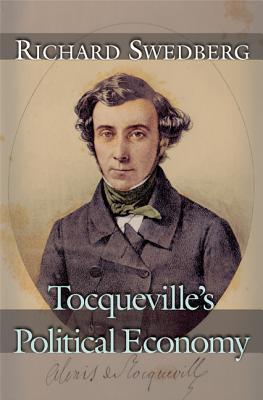

 Princeton University Press
Princeton University Press
Tocqueville's Political Economy


Key Metrics
- Richard Swedberg
- Princeton University Press
- Paperback
- 9780691178011
- 9.21 X 6.14 X 0.79 inches
- 1.2 pounds
- Business & Economics > Economics - General
- English
 Secure Transaction
Secure TransactionBook Description
Alexis de Tocqueville (1805-59) has long been recognized as a major political and social thinker as well as historian, but his writings also contain a wealth of little-known insights into economic life and its connection to the rest of society. In Tocqueville's Political Economy, Richard Swedberg shows that Tocqueville had a highly original and suggestive approach to economics--one that still has much to teach us today.
Through careful readings of Tocqueville's two major books and many of his other writings, Swedberg lays bare Tocqueville's ingenious way of thinking about major economic phenomena. At the center of Democracy in America, Tocqueville produced a magnificent analysis of the emerging entrepreneurial economy that he found during his 1831-32 visit to the United States. More than two decades later, in The Old Regime and the Revolution, Tocqueville made the complementary argument that it was France's blocked economy and society that led to the Revolution of 1789. In between the publication of these great works, Tocqueville also produced many lesser-known writings on such topics as property, consumption, and moral factors in economic life. When examined together, Swedberg argues, these books and other writings constitute an interesting alternative model of economic thinking, as well as a major contribution to political economy that deserves a place in contemporary discussions about the social effects of economics.
Author Bio
My two main areas of research are economic sociology and social theory. Economic sociology has been a vital interest of mine since the early 1980s; and today I mainly work on current topics. From early on I have also been fascinated by social theory, especially theorizing — what theorizing is and how it can be taught to students through practical exercises. My main work on this topic is The Art of Social Theory (2014). I have also worked on social mechanisms (see Social Mechanisms [1998]; ed. with Peter Hedström).
In the early 1980s I became interested in economic sociology, and I have had the pleasure to help this field grow into one of the major subfields in sociology. My contribution to this has consisted of general works as well as specific studies. For the former, see especially (ed. with Neil Smelser) Handbook of Economic Sociology (1994, 2005) and (ed. with Mark Granovetter) The Sociology of Economic Life (1992, 2001, 2011). For the latter, see e.g. (ed. with Victor Nee) The Economic Sociology of Capitalism (2005), (ed. with Trevor Pinch) Living in a Material World (2008) and (ed. with Hirokazu Miyazaki) The Economy of Hope (2017).
Along the road I have also made a number of studies of the major theoreticians in economic sociology, such as Joseph Schumpeter, Max Weber and Alexis de Tocqueville. The study of Schumpeter is formally a biography, but in reality centered around the relationship of economic theory to economic sociology. The study of Weber attempts to lay a theoretical foundation for economic sociology by following Weber’s leads in Ch.2 of Economy and Society. In my work on Tocqueville my interest in economic sociology comes together with that of theorizing. I emphasize the sociological aspects of Tocqueville’s analysis of the economy, but also how he experimented with different types of data and theories, to make sense of things. See Schumpeter – A Biography (1991), Max Weber and the Idea of Economic Sociology (1994) and Tocqueville's Political Economy (2009).
Besides social theory and economic sociology, I have also written on various other topics — such as the role of civic courage; (with Wendelin Reich) on George Simmel’s metaphors; on Rodin’s statue “The Burghers of Calais”; and (with Trevor Pinch) on Wittgenstein’s visit to Ithaca in 1949. These articles can be found on my webpage.
Today I mainly try to write sociological essays, with an emphasis on new ideas. The topics vary, from traditional ones in social theory to more unorthodox ones, with the same for economic topics.
Education
MM.L. (“Juris kandidat”), Faculty of Law, Stockholm University June 1970;
Ph D, Department of Sociology, Boston College May 1978.
Source: Cornell University
Videos








Community reviews
Write a ReviewNo Community reviews